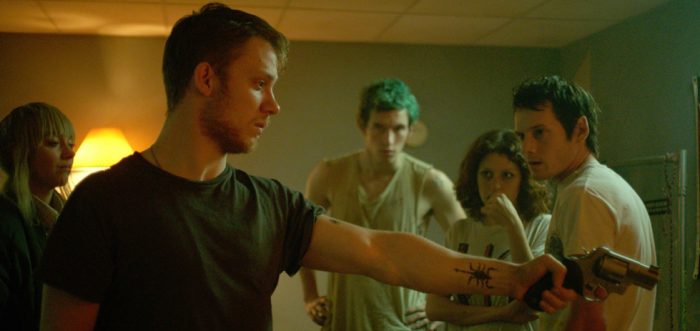
Among its many fine points, Jeremy Saulnier’s follow-up to his 2013 breakout Blue Ruin sets a new benchmark for tactile, wince-inducing onscreen brutality. Moreso than, for example, The Raid films, the physics and makeup effects of Green Room are pitched at such a level of verisimilitude that each instance of snapped limbs, sliced flesh, and canine maulings – just to name a few choice money shots – were enough to keep this desensitised viewer regularly watching the screen through a nervous squint.
In other words, and in accordance with its punk rock backdrop, Green Room is pretty hardcore. Aside from exhibiting all the formal elegance and narrative economy of Blue Ruin, Saulnier’s latest is as successful as it is inspired at transposing familiar generic elements onto an unlikely milieu. Music scenes are avenues where one forges a sense of identity for themselves, and punk/hardcore in particular is where demarcations of music taste and politics can seem like matters of life and death, leaving Saulnier without much work in literalising this idea for what is essentially Assault on Precinct 13: Punks vs. Skinheads Edition.
Green Room begins with a scene that establishes both its main ensemble’s punk bona-fides and the film’s own fleet-footed, thinking-on-the-go rhythms. Waking up to find their tour van off-road in a cornfield and out of gas, guitarists Pat (Anton Yelchin) and Sam (Alia Shawkat) of fictitious hardcore group The Ain’t Rights rush to a nearby parking lot to steal gas and keep moving on schedule. Desperate for a gig, they end up reluctantly agreeing to play at a rural squat house in rural Oregon, run largely by and for white supremacist punks. Having already effectively distanced themselves from the crowd with a cover of the Dead Kennedys’ “Nazi Punks Fuck Off”, the band finds themselves in deeper shit, both as witnesses to a backstage murder and then under siege from the club’s owner Darcy (a terrific Patrick Stewart), hell-bent on eliminating them with the help of an assortment of ruthless, burly skinhead henchmen.
It’s a setup ripe for a splatter-punk Troma lark, but Saulnier – who claims to have spent his youth immersed in the hardcore scene – plays it largely straight, and gets the details and casting right to sell this improbably scenario. Yelchin and Shawkat, decked out in Minor Threat and Dead Kennedys tees throughout, might look more like Hot Topic refugees than Sid & Nancy, but serve as appropriately out-of-their-depth ID figures, and project enough gravitas and charisma to compensate for their terse characterisations.1 But it’s a fierce and fiery Imogen Poots who stands out as the friend of the murdered punter, finding her allegiances shifting over the course of the night in the company of her hostage companions. With her angular beauty proving adaptable to this unglamorous role, her name should be at the top of the list of casting choices should a Fabulous Stains remake be planned.
Stylistically, Saulnier takes the same approach as Ruin, with natural lighting and warm, inviting room tones accentuating the realism necessary for the ensuing carnage to have full effect. If it’s not a leap forward in ambition from its predecessor – which excelled at being Rolling Thunder via Blood Simple but strained in its homestretch bid at being Chinatown via Unforgiven – it’s nonetheless the more complete and satisfying part of the color-coded diptych. To its advantage, Green Room has no such lofty goals; like a good hardcore 7”, it wastes no time doing what it does, doing it exceedingly well, and in turn making future spins an appealing prospect.
